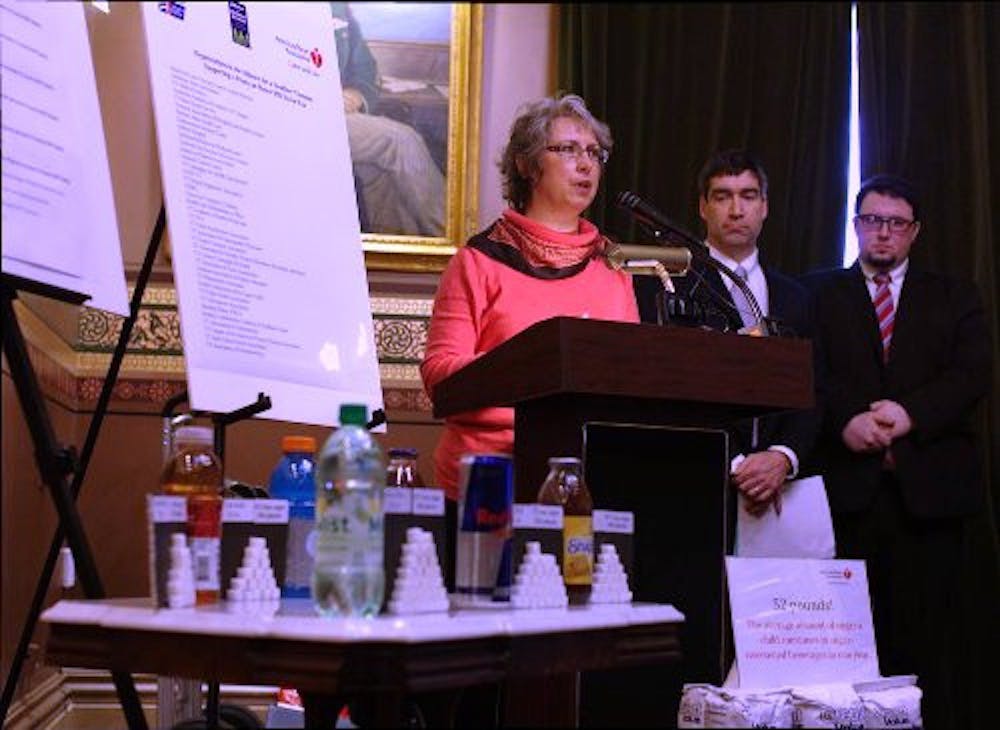On Wed Feb. 27 the highly debated bill that would impose an excise tax on sugar-sweetened beverages was approved by the Vermont State House Health Care Committee with a vote of 7-4.
The bill was first proposed in December by lead sponsor Rep. Dave Sharpe of Bristol with the support of the Alliance for a Healthier Vermont, which is a coalition of over 40 organizations including the American Heart Association, the Vermont Medical Society, many Vermont hospitals and other advocates outside of and within the statehouse. The primary goal of the bill is to address the growing issue of obesity in the state. It defines sugar-sweetened beverages (SSBs) as any drink that has sugar, including high fructose corn syrup. The tax would not be imposed on water, diet drinks, milk products or 100 percent fruit juice.
“There is a growing scientific knowledge base and understanding that sugar-sweetened beverages are a major contributor to heart disease, diabetes, tooth decay and obesity and we need to do a much better job of educating and changing the behavior of Vermonters and Americans towards their consumption of sugar-sweetened beverages,” said Sharpe.
Sharpe sees the proposed tax as an effective means of educating people on the risks of consuming sugary beverages.
“The approach that I took with the bill I submitted is to change behavior by creating a situation where it was more expensive [to buy sugar-sweetened beverages] than some healthier drinks,” he said. “This would create the kind of price differential for people whose behavior with regards to buying beverages is shaped, at least partially, by price, as they would be encouraged to buy a cheaper beverage that did not have added sugar.”
Currently 58 percent of adults and almost 27 percent of children in Vermont are considered overweight or obese. The health care costs of obesity are estimated to be around $140 million a year, with over 50 percent of Vermont’s Medicare and Medicaid expenses attributed to obesity. Proponents of the bill see the excise tax as the next-best option for trying to combat obesity in Vermont.
Furthermore, a study done by Yale University found that imposing a penny an ounce tax could result in upwards of $26 million annually in revenues. The revenues generated by the tax would be used in various places of need, but primarily for creating obesity prevention and education programs and for lowering the costs of health care for lower income residents.
Obesity has been a legislative concern for quite some time; in 2010 a bill of a similar nature did not make it out of the House Ways and Means Committee. Proponents of the bill believe that this excise tax will prove Vermont’s commitment towards securing a healthier populace.
“Currently ranked as the healthiest state in the nation, passage of the sugar-sweetened beverage tax could show how Vermont has been the leader in public health it has been known for in the past,” said Tina Zuk, government relations director of the American Heart Association.
The bill targets sugar-sweetened beverages specifically, as opposed to other junk foods, because of the particular dangers associated with sweet drinks.
“Because they are liquids, the body processes sugary drinks differently and simply doesn’t get full on them the same way it does with solids,” said Zuk. “Combine this with the fact that they add calories to the diet with no or little nutritional value and they make up 50 percent of the added sugars in the U.S. population. They are a sensible target for taxation.”
Opponents to the SSB tax attack the bill from different angles. Andrew MacLean ’76, a lobbyist for the Beverage Association of Vermont, believes that the tax “is purely a money grab allegedly for health care,” but otherwise has little to do with health care.
MacLean’s primary concern is that, if the SSB tax is passed, purchasing and consumption of all beverages — not just sugar-sweetened — will decline.
“It will lead to a steep increase in the cost of all beverages, not just sugar-sweetened beverages,” said MacLean. “This is because this is an excise tax as opposed to a sales tax, which is a six percent tax [in Vermont] that is applied to the product you are buying. An excise tax, meanwhile, is levied on the distributor. The SSB tax will be calculated by the amount of sugar-sweetened beverages that it sells. Distributors, therefore, would likely apply it to all beverages that they distribute.”
Others opponents of the tax are wary because of the decline in revenue throughout the state. Governmental leaders, such as Governor Peter Shumlin and State Speaker of the House Shap Smith have both voiced strong concerns regarding the bill’s impact on statewide revenues.
“From a revenue perspective the tax causes me some concern,” said Smith. “A tax like this that is meant to alter behavior can also end up reducing consumption and therefore reducing revenue in the state, so I tend to dislike passing revenue sources that decline over time.”
Many have compared the SSB tax to an excise tax that was imposed on tobacco. Proponents say that these taxes were successful in diminishing the use of cigarettes and raising funds to pay for educational programs used to deter Americans from smoking or drinking. Opponents of the bill, on the other hand, believe that the evidence used in support of this former excise tax was more conclusive than the evidence for SSB. Additionally, they believe the cost of altering behavior may be too prohibitive at this moment in time.
As of now the bill sits in the House Ways and Means Committee, where, according to Smith, the committee does not seem inclined to pass it. Instead, the state may have greater success passing a sales tax on sugar-sweetened beverages.
Although the sales tax would be markedly different from the proposed bill, “it is a very small step in the right direction,” said Sharpe, the lead sponsor of the excise tax bill. “I think it is a recognition on the part of the legislature that we have a problem and that the damage that’s being done to our society and the costs that are being incurred in health care due to SSB are significant and we have to begin to address it.”
The House Ways and Means Committee has not given any indication when they will decide on the bill, but it is expected to be voted on in the upcoming month.
Legislators Debate Sugary Drink Tax

Comments



